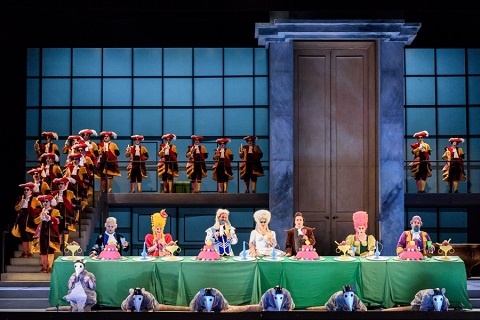
24 Nov 2018
Cinderella goes to the panto: WNO in Southampton
Once upon a time, Rossini’s La Cenerentola was the Cinderella among his operatic oeuvre.
English Touring Opera are delighted to announce a season of lyric monodramas to tour nationally from October to December. The season features music for solo singer and piano by Argento, Britten, Tippett and Shostakovich with a bold and inventive approach to making opera during social distancing.
This tenth of ten Live from London concerts was in fact a recorded live performance from California. It was no less enjoyable for that, and it was also uplifting to learn that this wasn’t in fact the ‘last’ LfL event that we will be able to enjoy, courtesy of VOCES8 and their fellow vocal ensembles (more below …).
Ever since Wigmore Hall announced their superb series of autumn concerts, all streamed live and available free of charge, I’d been looking forward to this song recital by Ian Bostridge and Imogen Cooper.
The Sixteen continues its exploration of Henry Purcell’s Welcome Songs for Charles II. As with Robert King’s pioneering Purcell series begun over thirty years ago for Hyperion, Harry Christophers is recording two Welcome Songs per disc.
Although Stile Antico’s programme article for their Live from London recital introduced their selection from the many treasures of the English Renaissance in the context of the theological debates and upheavals of the Tudor and Elizabethan years, their performance was more evocative of private chamber music than of public liturgy.
In February this year, Albanian soprano Ermonela Jaho made a highly lauded debut recital at Wigmore Hall - a concert which both celebrated Opera Rara’s 50th anniversary and honoured the career of the Italian soprano Rosina Storchio (1872-1945), the star of verismo who created the title roles in Leoncavallo’s La bohème and Zazà, Mascagni’s Lodoletta and Puccini’s Madama Butterfly.
Evidently, face masks don’t stifle appreciative “Bravo!”s. And, reducing audience numbers doesn’t lower the volume of such acclamations. For, the audience at Wigmore Hall gave soprano Elizabeth Llewellyn and pianist Simon Lepper a greatly deserved warm reception and hearty response following this lunchtime recital of late-Romantic song.
Collapsology. Or, perhaps we should use the French word ‘Collapsologie’ because this is a transdisciplinary idea pretty much advocated by a series of French theorists - and apparently, mostly French theorists. It in essence focuses on the imminent collapse of modern society and all its layers - a series of escalating crises on a global scale: environmental, economic, geopolitical, governmental; the list is extensive.
For this week’s Live from London vocal recital we moved from the home of VOCES8, St Anne and St Agnes in the City of London, to Kings Place, where The Sixteen - who have been associate artists at the venue for some time - presented a programme of music and words bound together by the theme of ‘reflection’.
'Such is your divine Disposation that both you excellently understand, and royally entertaine the Exercise of Musicke.’
Amongst an avalanche of new Mahler recordings appearing at the moment (Das Lied von der Erde seems to be the most favoured, with three) this 1991 Mahler Second from the 2nd Kassel MahlerFest is one of the more interesting releases.
‘And there was war in heaven: Michael and his angels fought against the dragon; and the dragon fought and his angels, And prevailed not; neither was their place found any more in heaven … that old serpent … Satan, which deceiveth the whole world: he was cast out into the earth, and his angels were cast out with him.’
If there is one myth, it seems believed by some people today, that probably needs shattering it is that post-war recordings or performances of Wagner operas were always of exceptional quality. This 1949 Hamburg Tristan und Isolde is one of those recordings - though quite who is to blame for its many problems takes quite some unearthing.
There was never any doubt that the fifth of the twelve Met Stars Live in Concert broadcasts was going to be a palpably intense and vivid event, as well as a musically stunning and theatrically enervating experience.
‘Love’ was the theme for this Live from London performance by Apollo5. Given the complexity and diversity of that human emotion, and Apollo5’s reputation for versatility and diverse repertoire, ranging from Renaissance choral music to jazz, from contemporary classical works to popular song, it was no surprise that their programme spanned 500 years and several musical styles.
The Academy of St Martin in the Fields have titled their autumn series of eight concerts - which are taking place at 5pm and 7.30pm on two Saturdays each month at their home venue in Trafalgar Square, and being filmed for streaming the following Thursday - ‘re:connect’.
The London Symphony Orchestra opened their Autumn 2020 season with a homage to Oliver Knussen, who died at the age of 66 in July 2018. The programme traced a national musical lineage through the twentieth century, from Britten to Knussen, on to Mark-Anthony Turnage, and entwining the LSO and Rattle too.
With the Live from London digital vocal festival entering the second half of the series, the festival’s host, VOCES8, returned to their home at St Annes and St Agnes in the City of London to present a sequence of ‘Choral Dances’ - vocal music inspired by dance, embracing diverse genres from the Renaissance madrigal to swing jazz.
Just a few unison string wriggles from the opening of Mozart’s overture to Le nozze di Figaro are enough to make any opera-lover perch on the edge of their seat, in excited anticipation of the drama in music to come, so there could be no other curtain-raiser for this Gala Concert at the Royal Opera House, the latest instalment from ‘their House’ to ‘our houses’.
"Before the ending of the day, creator of all things, we pray that, with your accustomed mercy, you may watch over us."

Once upon a time, Rossini’s La Cenerentola was the Cinderella among his operatic oeuvre.
The single ‘comic’ opera alongside the nine serious works that he wrote for the Teatro San Carlo in Naples between 1815 and 1822, it was regarded by the French poet Théophile Gautier as “a bottomless treasure, as if someone, in a fit of extravagance, plunged their arms up to their elbows into a pile of precious stones and then randomly started to throw handfuls of rubies and diamonds up into the air”. However, others lamented Rossini’s subversion of sentimental comic convention. Stendhal, after attending performances in Milan and, two years late, in Rome, expressed his dissatisfaction: “performance after performance left me cold and unmoved, beautiful as it is, [the music] seems to me to be lacking in some essential quality of ideal beauty.”
Above all, Stendhal lamented what he felt was the absence of ‘true’, elevating emotion in the portrayal of the characters of humble origin. Jacopo Ferretti’s libretto places the well-known fairy tale in a bourgeois context. Out with the fairy godmother and in with a charitable philosopher-cum-tutor who wishes to see his princely charge marry a ‘good’, honest lass. Out with the cruel step-mother and in with a socially and financially grasping step-father, Don Magnifico. Out with the glass slipper and in with a glittery bangle, a simple gift from the disguised Prince Ramiro which confirms Cinders’ lack of snootiness and avarice. Stendhal complained that Rossini’s score illuminated nothing but “the petty hurts and pettier triumphs of snobbishness”.
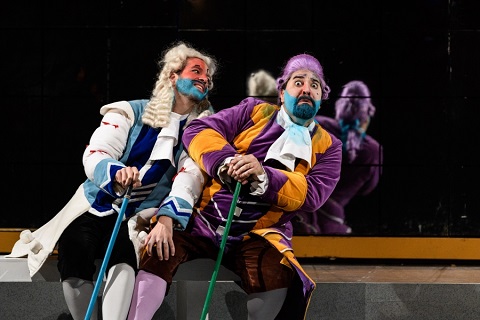 Giorgio Caoduro (Dandini), Fabio Macchioni (Don Magnifico). Photo credit: Jane Hobson.
Giorgio Caoduro (Dandini), Fabio Macchioni (Don Magnifico). Photo credit: Jane Hobson.
Director Joan Font’s production - first performed by Welsh National Opera in 2007 - tries to resurrect some of the transformative magic of Alice’s Wonderland … by making a trip to Poundland. Designer Joan Guillén’s sets and costumes are bold and brassy: all plastic and plasticine and primary hues. Font and his Barcelona-based company Comediants have often exploited Mediterranean carnivalesque, and one might wonder if Font’s conception was influenced by Gautier’s praise: “Looking again at the music one sees how, just like playing the castanets, a sparkling line of trills and arpeggios blossoms forth. The music sings and laughs!” For, Font conjures the eighteenth-century Enlightenment through the vitality of a Spanish palette and the hyperbole of cartoon caricature.
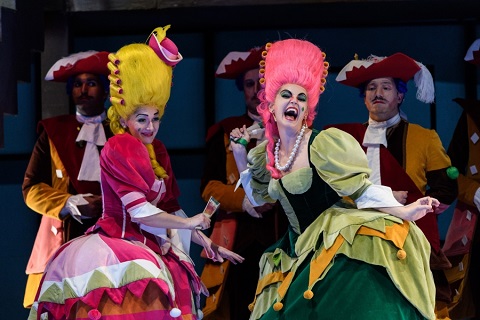 Heather Lowe (Tisbe), Aoife Miskelly (Clorinda). Photo credit: Jane Hobson.
Heather Lowe (Tisbe), Aoife Miskelly (Clorinda). Photo credit: Jane Hobson.
The mundane, magical and plain mischievous co-exist. Cinders goes to the ball in a sedan chair which her rodent ‘courtiers’ and carpenters have assembled from a shabby chest of drawers; the Prince’s coach is magicked into being by some rotating mirrors … but later its miniature model is derailed by a roguish rat. Font puts the panto back into a period piece which had itself embodied the tension between ‘pure’ sentimentality and sensibility as hijacked by middle-class social climbers, but in so doing takes away much of the genuine enchantment of Rossini’s music as visual gags overpower vocal expression.
To some extent, though, this production was defeated by the size of Southampton’s Mayflower Theatre; when it opened in 1928 it was the largest theatre in the south of England, and still seats almost 2,300. Guillén’s designs seem to carry the cast to the far reaches of the vast stage; when atop the raised balcony at the rear, descending the framing stairs, or nestled within the grey-brick inglenook - especially when the mantle was raised to reveal the grand entrance to the Prince’s palace - the soloists sometimes struggled to project.
Likewise, in this barn of an auditorium conductor Tomáš Hanus struggled at times to keep the ensemble forces together. Proceedings got underway with a somewhat sluggish, desultory overture, with some questionable tuning from horns and wind, and rather listless Rossinian crescendos which were aching for an injection of ‘Formula-1’ acceleration. The patter of Don Magnifico’s first aria - sung briskly and ebulliently by Matteo Macchioni - in which he curses his daughters for waking him from his dream of being turned into a donkey - left the WNO Orchestra trailing in his wake. But, subsequently, Hanus put his foot on the pedal and left the Prince’s courtiers lagging behind. The ensembles were often metrically messy and occasionally in danger of skidding of the circuit. Perhaps it did not help that the laughs came from the visual trappings rather than from the dramatic interaction of the cast who were often left languishing in theatrical isolation in the ensemble numbers.
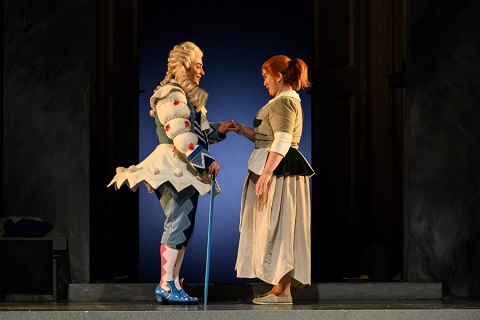 Matteo Macchioni (Don Ramiro), Tara Erraught (Angelina) Photo credit: Jane Hobson.
Matteo Macchioni (Don Ramiro), Tara Erraught (Angelina) Photo credit: Jane Hobson.
That said, some superb singing offered much to admire. Don Magnifico might come across as a mean-spirited materialist but Fabio Capitanucci gave him a patina, at least, of lovability - and demonstrated a fine technique and good dramatic judgement. As Clorinde and Tisbe, Aoife Miskelly and Heather Low established their respective characters well at the start - much poncing, preening and ‘prettifying’ - and despite the parody which infects their song, and the brittleness of their boasting and bullying, they never sounded shrill.
As the human philosopher, Alidoro, Wojtek Gierlach - denied a magic wand but cloaked in a star-spangled cape - was a sonorous Prospero-cum-Sarastro, and if he didn’t quite attain a spiritual stature then he sang with beauty and authority.
Prince Ramiro was neatly sung by Matteo Macchioni; his tenor has brightness if not real bloom, and he presented a charming characterisation of a man who is more an emblem than an embodiment of royalty, and who doesn’t really find his ‘self’ until he’s wearing someone else’s suit.
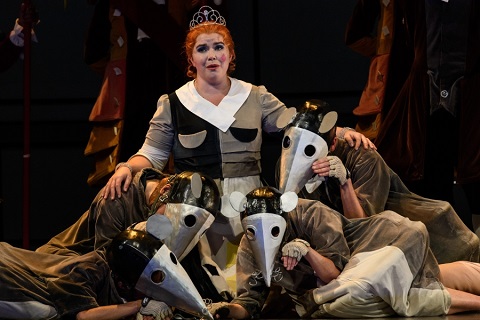 Tara Erraught (Angelina), WNO Dancers. Photo credit: Jane Hbson.
Tara Erraught (Angelina), WNO Dancers. Photo credit: Jane Hbson.
Wearing the figurative crown though, appropriately, was Tara Erraught, who somehow imbued Cinderella’s lovely first aria, ‘Una volta c’era un re’, with sadness, longing, and hope, simultaneously. She was both of this world - down-to-earth and without illusion - and innocently unworldly. Vocally, her line was pure and controlled; the coloratura clean and clear; the pristine, polished evenness and sparkle of her tone heart-winning. No wonder the Prince was smitten. A pragmatist rather than a Prince hunter, this Cinders did not let good fortune tarnish her innocence or dull her natural glow of goodness.
Cinders’ helpmate-rodents - ever-present, ever-twitching - both stole the show and kept it on the road: observing and facilitating, overseeing and fixing. But, when the loudest applause is generated by the balletic unrolling of the red carpet by a pair of rats, something must surely be amiss. But if, like Stendhal, one missed a certain nobility of feeling, then at least, and luckily for the rats, there was no Cheshire Cat lurking in the inglenook.
Claire Seymour
Rossini: La Cenerentola (co-production between Welsh National Opera, Houston Grand Opera, Gran Teatre del Liceu and Grand Théâtre de Genève)
Angelina (Cinderella) - Tara Erraught, Clorinda - Aoife Miskelly, Tisbe - Heather Lowe, Don Ramiro - Matteo Macchioni, Don Magnifico - Fabio Capitanucci, Alidoro - Wojtek Gierlach, Dandini - Giorgio Caoduro, Rats/Dancers - Colm Seery, Darío Sanz Yagüe, Ashley Bain, Meri Bonet, Lucy Burns, María Comes Sampedro, Lauren Wilson; Director - Joan Font, Conductor - Tomáš Hanus, Revival Director/Choreographer - Xevi Dorca, Designer - Joan Guillén, Lighting Designer - Albert Faura (realised on tour by Paul Woodfield), Welsh National Opera Orchestra.
Mayflower Theatre, Southampton; Thursday 22nd November 2018.